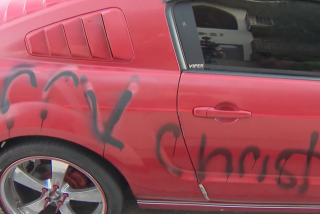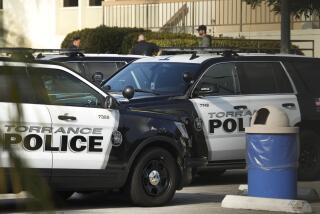Valencia Businessman Fined $1,236 Over ‘Duck’ Sign : Courts: Gary Shaw, sentenced to a year’s probation, immediately files an appeal contending his constitutional right of free speech was violated.
- Share via
A Valencia businessman who was convicted of disturbing the peace by posting what neighbors said was an obscene sign was sentenced Thursday to one year probation and fined $1,236.
Newhall Municipal Judge Floyd V. Baxter said he had considered ordering Gary Shaw to serve jail time in what became known as the “Suck My Duck” case, but instead followed the recommendation of the state probation department and imposed a lighter sentence. The judge also indicated he would be willing to remove the misdemeanor conviction from Shaw’s record at the end of the probation period if Shaw “keeps his nose clean.”
But Shaw, who repeatedly turned down offers to settle the case and has spent about $21,000 in legal fees during the past two years, immediately filed an appeal Thursday claiming his constitutional right to free speech had been violated.
First Amendment experts agreed, saying Shaw is likely to win on appeal.
“He has an excellent chance of prevailing because the Supreme Court has said that even profanities are protected speech,” said Erwin Chemerinsky, a USC law professor who specializes in free speech issues.
Shaw, who owns a messenger service, was charged with disturbing the peace in August, 1990, after he taped a handmade sign to the rear window of his van and parked it in front of his house on Elder View Drive after receiving a ticket from Los Angeles County Sheriff’s Deputy John Banks. During the trial, Shaw testified that the sign said: “Deputy J. Banks Can Suck My Duck.”
But neighbors testifying for the prosecution said the sign originally contained an off-color word that Shaw changed to “duck” after residents angrily confronted him because their children had seen the sign.
Deputy Dist. Atty. Michael P. Noyes said state law prohibits posting “offensive words in a public place that are likely to provoke an immediate, violent reaction.” Shaw’s sign met the legal standard because it provoked a verbal argument between Shaw and his neighbors, Noyes said.
The prosecutor had asked the judge to send Shaw to jail or order him to work five days on a Caltrans cleanup crew. The offense carries a maximum penalty of 90 days in jail.
Shaw’s attorney, Ira M. Salzman, argued unsuccessfully for a new trial, saying Shaw was ill-served by an earlier attorney who failed to address the First Amendment issues of the case properly.
Salzman cited several precedent-setting First Amendment cases, including a 1971 U.S. Supreme Court decision, Cohen vs. California, in which misdemeanor charges of disturbing the peace were dismissed against a man who had protested outside the Los Angeles County Courthouse wearing a jacket making an obscene comment against the draft.
In that case, according to Chemerinsky, the court ruled that the state has no right to “cleanse public debate to the point where it is . . . palatable to the most squeamish among us.”
Chemerinsky said it is not unusual for lower court rulings in First Amendment cases to be overturned.
“Sometimes the desire to side with law enforcement causes lower court judges to lose sight of First Amendment issues,” he said.
More to Read
Sign up for Essential California
The most important California stories and recommendations in your inbox every morning.
You may occasionally receive promotional content from the Los Angeles Times.













